Intro
So, yet another letter exchange! It seems like it is becoming my mainstay. Which I love!
This one is with
who writes the logic and morality substack.And what we are going to be discussing is parenting philosophies.
It started when she wrote that she believed in ‘Gentle Parenting’, and that, according to them, a child should not be forced to hug their grandparent and I disagreed
Now, personally, I think the child should hug their grandparents. But, then, I was never accused of being a gentle parent :)
We went back and forth a bit in the comments, and decided to have a letter exchange! Hurray, letter exchanges!!
Now, for the purposes of this exchange, I have named my parenting philosophy ‘Woodshed Parenting’, and that for several reasons. First of all, as an antithesis or contrast to ‘Gentle Parenting’. Secondly as a bit of a troll on modern society. And thirdly because of the old fashioned air it gives. We not only don’t use the woodshed for its disciplinarian purpose nowadays, we don’t even have them!
Goals.
As part of our exchange, Rivka wrote:
I believe that raising respectful children is a function of parents being crystal clear on their own moral compass, willingness to push themselves to lead a moral life to model proper behavior for their children, and the resolve to surround their children with people they would be happy for their children to copy. I think the nostalgia for harsh discipline is misplaced. Today’s parents, and often grandparents, can’t define right and wrong for themselves and their children. They cannot outline or explain expectations and that’s why their children lack respect, and are more likely to exhibit true selfishness and true laziness, lack of accountability, excusing immoral behavior, etc. People today don’t think their actions make a difference, that their behavior matters.
i think it’s a pretty unique take: right wing worldview with left wing methods. That’s why I think my critique is worth sharing.
I believe that she raises several important issues in this little quote, and one of them, perhaps even the most important, is this: parents should have goals for their parenting. She mentions: respect, selfishness, laziness, lack of accountability, excusing immoral behaviour, and not thinking that their behaviour matters.
Turning that into a positive list, I believe she is saying that she thinks parents should wish their children to be:
1) Respectful
2) Generous
3) Hard Working
4) Responsible
5) Moral and/or properly judgemental of their own behaviour
6) Understanding of agency
Some of those might be a bit off, but I think I got the gist. She can feel free to correct me.
So where we definitely agree is that I believe that all parents should have goals for their parenting. I even agree with all of the above goals. And I would add to them.
But for this section I am seconding what I believe is her desire: that parents should think through the goals that they should have for their children, and work out their parenting to accomplish those goals.
Bibliography
Before I go any further, I’m going to do something odd. I’m going to start compiling a bibliography. Books that, to one extent or another, in one area or another, I believe help define what I am calling ‘woodshed parenting’.
The Scriptures: Old and New Testament
For a good understanding of Woodshed Parenting one has to read the Scriptures. Both the ‘how to’ parenting principles, and the principles that should be instilled during parenting are found there. The Scriptures, Old and New Testaments.
There are some other books that I would recommend in addition to the Scriptures, but never instead. As with any recommendations I make, I would recommend that parents pre-read these books before giving them to their children.
The Little Britches series, by Ralph Moody
This series is semi-autobiographical, and takes place in the early 1900’s, mostly in the west of the United States. Issues of hard work, perseverance, responsibility and accountability are paramount. The woodshed is used, but so is the statement and action on clear goals of parenting; especially by the father. I can heartily recommend these books for parents and children. Parental discretion advised, as they include some hard themes and some objectionable language.
Captain’s Courageous, by Rudyard Kipling
This book might almost have been written as a direct antidote to modern helicopter parenting. A spoiled young man is forced to work for his living, and his father (in particular) is forced to confront his parenting failures. Although there is no woodshed in this book (the events taking place on a ship), the woodshed is used metaphorically.
The Bobtails meet the Preacher’s Kid, by Arthur Yeomans
This book involves orphans and a widowed aunt, thus the issues of parenting are addressed in crisis. Again, issues of hard work, responsibility, and respect for new authority are paramount. And there is a literal woodshed, literally and metaphorically used.
Both this book and it’s sequel are available on Kindle Unlimited
No Ordinary School, by Arthur Yeomans
There is no woodshed in this book, either literal or metaphorical. The main character is a bit past his woodshed days. But this book addresses the issue of, “If my child has a weakness…” and challenges the oft used idea “… I need to not push him in that area”, substituting “… I need to work extra hard in that area to prepare him for life.”
kindle unlimited
Swallows and Amazons, by Arthur Ransome
No woodshed, at least not onscreen. But a great antidote to helicopter parenting. the children strongly respect authorities and parents. Deals with issues of responsibility and accountability.
Set in England… which is a fun plus. And beautifully written
Principles
One thing I really, really like about this particular letter exchange is that it will give me an opportunity to get out all of my grandfather advise! Oh, I write it down, and I dole it out to my children from time to time, but its great to get a chance to do a great data dump of all of it and (hopefully) discuss it point by point, in details.
Anyway, here are some, few, to be added to, principles that I believe should be part of one’s parental philosophy.
Dulce et decorum est.
I’m going to start with a hard one. The quote, from Latin, is ‘How sweet and beautiful it is to die for the fatherland.’ Now, before you hang up on me, or accuse me of being a warmonger, or of being naive about the realities of war…
What I think that this Latin saying is, umm, saying; at its best and most profound, is that there are things which are more important than life. And I believe that when we are doing our parenting, we need to keep those things foremost. Our goal should not be, “Eat, drink, and be merry, for tomorrow we die.’
Children should be seen and not heard
I’m deliberately picking these to be offensive to modern ears. How am I doing?
What I believe this saying means, at its best, is that there is a fundamental difference between adults and children, and children should be taught this. They should be taught that when two adults are talking, that is not the time to come screaming through the room (if there ever is a time to come screaming through the room, which I doubt) or for questions about her dolly.
This principle teaches that parents/adults are older and wiser; so children should be listening to them, and learning from them. Proud children interrupt, wise children listen.
Respect your elders
Use of the word, sir and ma’am and Mr and Mrs and Miss and I would even like to bring back the word Master (used for unmarried males). Speaking respectfully to each other, and especially to adults calling people by their titles, such as Uncle or Aunt.
What a child can do
The purpose of childhood is training for adulthood. What a child can do, the child should do. His parents are not his slaves. There are things that the children can’t do, and when the children do the things they can do, they free up the parent to concentrate on those things.
Anti-helicopters
Not the black helicopters of the conspiracy theories, but the parenting kind. Woodshed parenting is anti-coddling, anti-hovering.
Heirarchical Obedience
As the father of six children I was often asked, as with awe, how I did it. How did we manage all of those children? Well, one of the most imporant things we did was to teach them to manage themselves. Not just self-discipline, although that is supremely important, but other discipline. ‘Younger than me’ discipline.
Weakness and Strength
The Godly Woodshed parent looks to both the strength and weakness of his children. He glories in their strength, and butresses their weakness.
Facts don’t care about your feelings
When I worked on the ambulance I got to see parents at their best and their worse. I saw good, helpful parents, and horrible, destructive parents. One huge mistake that many parents made was to be ruled by their feelings… and let them blind them to truth.
Proper response
First Resort
Let me make something very clear about Woodshed parenting: Physical discipline is not a ‘last resort’. It is to be used when called for, immediately, without counting or chances or the like. The Woodshed parent has a list of responses in his repertoire, which he uses as appropriate… not when he gets angry or desperate. Not explosively but calmly, matter of factly. Explaining the rule, and demonstrating the result of breaking it.
Physical Reaction
Let me be very clear: I think physical discipline of children is commanded in Scripture. That is both the beginning and end of that discussion for me. Unless one wishes to get into Scriptural interpretation and the like the issue is closed.
However, I also believe that the issue can be supported in other ways, and will do so. For this post I think I will limit myself to saying that there is an obvious difference in the way that the brain processes the various different methods of discipline. One is not merely ‘harsh’ and the other ‘gentle’. I have seen all sorts of non-physical punishments that were very harsh indeed.
Our brains process physical and non-physical events very differently. The child who is yelled at for touching the electrical plug will have a rather different pathway built than the child who shocks themselves, and both differently from the child who is given a time out or who has their hand slapped. We cannot merely make a sliding scale between ‘harsh’ and ‘gentle’.
In my book ‘Contract Marriage’ the main character is moving from a planet where children and adults are punished with ‘punishment bracelets’. These go on the wrist and randomly zap the wearer, whereupon the person being punished is required to ‘apologize’ to the bracelet. This goes on for a period of time, depending upon the severity of the offense… possibly days.
On the other planet they are immediately asked if they agree to be whipped, whipped, and then asked to state what rule they violated. And then all done. The character states that she prefers that to the long time frame of the bracelet. Which is better? Well, I think the whipping. But the point is… they are different.
When I was a kid a normal offence and Mommy would turn you over her knee. But for truly grievous offences it would be ‘Wait till your father gets home”. Or sometimes she would turn you over her knee and then say ‘wait till your father gets home’!!
All this to say that I think it is clear that different forms of punishment have different effects, we can’t merely speak of ‘harsh’ and ‘gentle’.
Training
One important feature of Woodshed Parenting is training. Not merely going along with life and getting interrupted by some issue that needs addressing… but proactively arranging the schedule to present and practice the issue. The children won’t sit still in the car? Bring the car seats inside, sit them on the couch, and practice. You can even get your vacuuming down at the same time.
Conclusion
Well, I don’t think I have done all that much toward laying out what ‘Woodshed Parenting’ looks like, but I have laid the groundwork for the first part of the definition. Woodshed parenting starts with proper principles, proper goals. It sees where it is trying to go, and keeps it in mind as it goes along. It’s second feature is proper reaction: punishments and other reactions chosen to fit the goal. The third feature is training: not merely waiting for a situation to happen, but causing the situation to happen at a time and location of the parent’s choosing.
Part of what I hope to accomplish here is to develop a list of goals. Sure, we are disagreeing on the means to get there, but how much of that is dependent upon where we want to get to? What is my list, what is her list, and what list do the commentators see as important in raising children?
I’m hoping that this will be a very productive conversation, even if we end up disagreeing.
And ye have forgotten the exhortation which speaketh unto you as unto children, My son, despise not thou the chastening of the Lord, nor faint when thou art rebuked of him:
For whom the Lord loveth he chasteneth, and scourgeth every son whom he receiveth. If ye endure chastening, God dealeth with you as with sons; for what son is he whom the father chasteneth not? But if ye be without chastisement, whereof all are partakers, then are ye bastards, and not sons.
Furthermore we have had fathers of our flesh which corrected us, and we gave them reverence: shall we not much rather be in subjection unto the Father of spirits, and live? For they verily for a few days chastened us after their own pleasure; but he for our profit, that we might be partakers of his holiness.
Now no chastening for the present seemeth to be joyous, but grievous: nevertheless afterward it yieldeth the peaceable fruit of righteousness unto them which are exercised thereby.
Hebrews 12:5-11







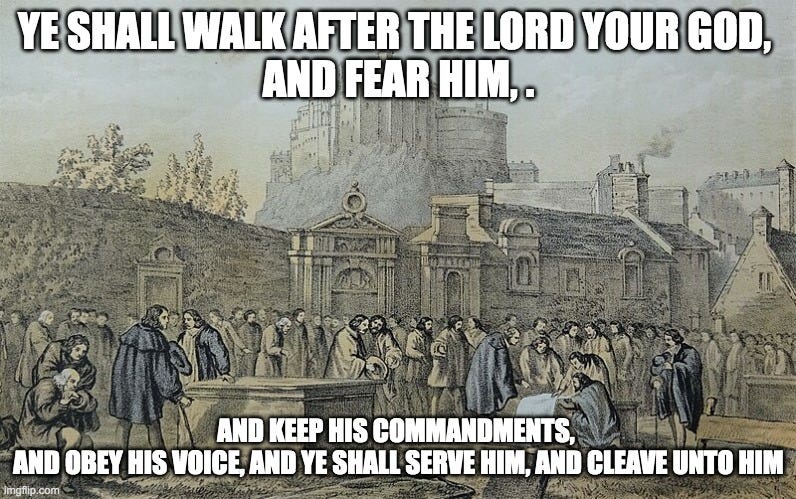
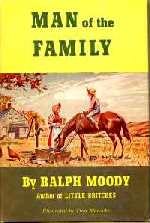



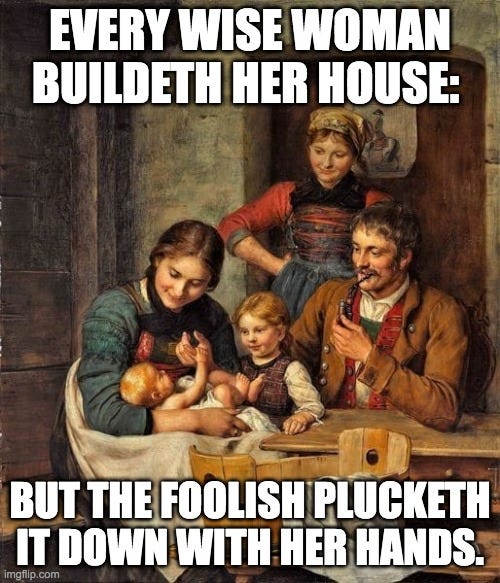

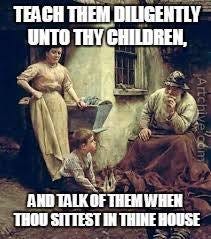

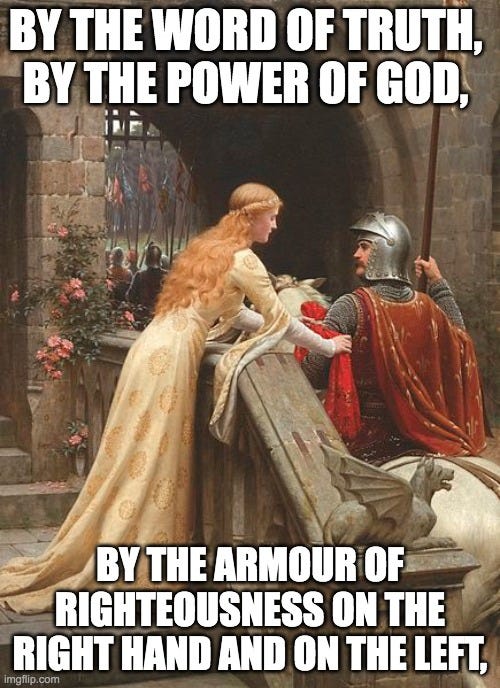
I posted my response
https://open.substack.com/pub/logicandmorality/p/gentle-parenting?r=2z8wkz&utm_medium=ios&utm_campaign=post
This is helpful, as I've seen the "gentle parenting" movement continue to gain momentum with young parents. It seems its advocates err in at least two ways. First, they provide an unbiblical definition for gentleness—one that has no room for true correction as the scriptures define and illustrate it (anything else is viewed as harsh; use diversionary tactics instead!). I sometimes wonder if they would describe the Lord's discipline of his children as gentle. The second's related to the first, in that it's proponents wrongly elevate gentleness as a kind of higher virtue, pitting it against what godly love often requires. So much more could be said, but cf Proverbs 13:24.